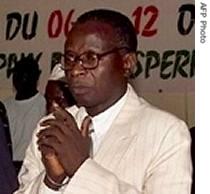2007年VOA标准英语-Casamance Violence Likely to Become Issue in Se(在线收听)
By Jordan Davis
Dakar
02 January 2007
Senegalese President Abdoulaye Wade attended funeral services Tuesday for a close political ally assassinated earlier this week in the Casamance region of the country. Violence in Casamance has persisted despite a peace accord signed just over two years ago. From Dakar, Jordan Davis reports for VOA that voters in Senegal are scheduled to head to the polls in two months and the violence in Casamance is likely to become an issue in the country's presidential campaign.
 |
| El-Hadj Oumar Lamine Badji (file photo) |
Mr. Wade offered a $100,000 reward, plus a passport and an air ticket to leave the country to anyone who supplied information leading to the arrest of the killers.
The president had signed a 2004 peace agreement with the political wing of the Movement of Democratic Foces in Casamance, ostensibly putting an end to a two-decade long armed independence fight.
In earlier televised remarks, Mr. Wade said Casamance is mostly peaceful but extremist factions want the world to believe the war continues.
Several armed factions in Casamance did not sign the peace agreement. It is widely believed Badji's assassination is linked to those hard-line independence groups. They are also blamed for an ambush two weeks ago against Senegalese army troops.
The violence comes two months before national elections.
Local journalist Alassane Samba Diop says the issue will provide fodder for opponents of Mr. Wade, who seven years ago campaigned on the promise of peace in Casamance within one hundred days.
Moustapha Fall Tche leads the Patriotic Action for Liberation party and is a member of an opposition coalition that is fielding candidates against the ruling party in the coming elections.
Tche says the government inflamed tensions in the region last year when it sent soldiers on a security mission against banditism.
Opposition politicians also say the government should do more to get rebel leaders to the negotiating table.
But Richard Reeve, an analyst with the British research institute Chatham House, says he is not sure the armed splinter groups are willing to talk.
"The problem with the violence is that it is perpetrated by a hard-line faction of people that are difficult to appease," he said. "These are people who want real independence for Casamance."
Reeve says the splinter groups do not have much popular support. Casamance residents, he says, do not want to break away, but do want an end to economic and social isolation.
The region is mostly cut off from the rest off the country by the Gambia.
Ferry services between Ziguinchor and Dakar restarted in November. Service had been suspended for nearly five years following the Joola disaster where over 2,000 people died when a boat sank.
And the government recently unveiled ambitious plans for a high speed rail line.
Parts of Casamance are also littered with landmines, following a 20-year civil war. The government has promised to clear them by 2009.
Rebel hardliners have told local newspapers they believe that the Moroccan forces accompanying the de-mining teams are a provocation.
But Richard Reeve with Chatham House says removing landmines will help the government get control of the situation.
"These minefields are a very visible reminder that the conflict is not settled," he said. "And they protect rebel positions and possibly rebel resource interests."
Aid groups say mine removal would also mean a better quality of life for people living in Casamance. The British charity Handicap International estimates over 800 people have been maimed by landmines there.